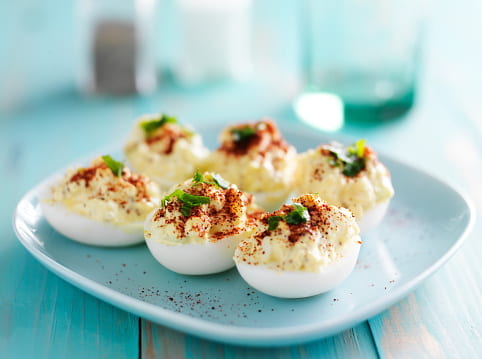Eggs are a healthy food. They are high in nutrients and easily digested. But talk to your doctor if you have high cholesterol, heart disease, or diabetes before you add more to eggs to your diet, although their cholesterol is not the dietary fiend once thought.
An egg contains about 75 calories, protein for muscles, choline for healthy brain development, vitamins A, D, E, K – which maintain healthy skin, eyes, bones, and teeth, antioxidants that can help protect cells from cancer, lutein and zeaxanthin for healthy eyes, plus iron, folate and zinc.
Protein is an essential part of a nutritious diet; but foods that supply protein are some of the most expensive items on the grocery list. Protein in eggs is both high in quality and low in cost. Eggs are the most complete source of protein (even more complete than the steak you ordered the other night) you can eat. One egg equals one ounce of lean meat, poultry or fish.
Eggs are perishable and must be properly stored, prepared, and served. Raw eggs contain a risk of Salmonella, bacteria that can’t be seen, smelled or tasted but can make you sick. Follow these precautions from the U. S. Department of Agriculture when handling both raw eggs and foods in which eggs are an ingredient, such as frittata, cake batter, or baked custard:
- Keep eggs in their original carton and refrigerate as soon as possible. Do not wash eggs before storing or using them. Washing is a routine part of commercial egg processing and rewashing is unnecessary.
- Avoid keeping raw or cooked eggs and egg-containing foods out of the refrigerator for more than two hours, including time for preparing and serving (but not cooking). If you hide hard-cooked eggs for an egg hunt, either follow the two-hour rule or do not eat them.
- Wash hands, utensils, equipment, and work areas with hot, soapy water before and after they come in contact with eggs and egg-containing foods.
- Avoid eating raw eggs and foods containing raw eggs such as homemade mayonnaise or cookie dough. Commercial forms of these products are safe because they are made with pasteurized liquid eggs. Commercial pasteurization destroys Salmonella bacteria.
- Cook eggs thoroughly until both the yolk and the white are firm. Cook casseroles containing eggs to 160°F to kill Salmonella. Check temperatures with a thermometer. A thoroughly cooked egg is a thoroughly safe egg.
Serving ideas
Use hard-cooked eggs to make egg salad or deviled eggs. Add chopped eggs as a topper to a green leafy salad. Add egg slices to crispy toast for a quick breakfast. Add chopped eggs to a casserole for added protein. High heat toughens the protein in eggs; cook them gently.
Deviled Eggs
Cook 6 eggs: place them in a pan, cover with cold water and a lid, boil lightly for 2 minutes, remove from the heat and let stand for 15 minutes, drain and cool in cold water. Remove shells and cut eggs in half lengthwise. Mash yolks and mix with 2 tablespoons finely chopped sweet onion, 2 tablespoons sweet pickle relish (or 1 teaspoon vinegar), 3-4 tablespoons light mayonnaise, 1 teaspoon mustard, salt/pepper. Fill egg whites with yolk mixture and refrigerate. Makes 6 servings, 110 calories each, 6g fat, 55% calories from fat, 0 fiber, 6g protein
Source: Iowa State Extension
Linda Altenburger, Senior Nutritionist, SNAP-Ed
